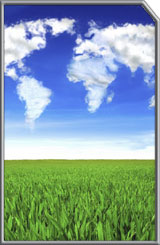Environmental Issues
Climate change.
Global temperatures have risen consistently for the past 140 years and it is now widely accepted that this change is linked to man-made greenhouse gas emissions that have increased with industrialisation and the burning of fossil fuels.
Climate change is a better phrase than global warming because it encompasses many kinds of effects. Some areas will be warmer, some cooler, sea levels may rise, polar ice caps may melt, deserts might spread across Europe and extreme weather events may become more frequent.
The main greenhouse gas is carbon dioxide, which is produced by the burning of fossil fuels. Levels in the atmosphere have risen by a third since the industrial revolution started in the 1760s.
Energy.
Energy is stored work. It can be converted from one form to another but it cannot be created or destroyed. The quantity of energy available always remains the same so technically the world does not consume any energy at all. When we talk about human activity involving energy use, we actually mean energy conversion.
When early humans first learned how to start a fire, they were developing a way to harness energy. Since then we have released energy from burning wood, dung, coal, petroleum and natural gas, and by using water flow, steam, wind, and uranium.
Carbon emission definitions from the web.
- Releases of carbon to the atmosphere as part of compounds that arise from man-made processes such as energy use or agriculture.
- Carbon that enters the atmosphere as a result of burning carbon-based fuels, chiefly coal, oil and natural gas
- As the atmospheric concentration of carbon dioxide changes, so does the earth's temperature. Thus carbon emissions tell us a lot about ourselves and our current habits and provide clues about the kind of world we will be leaving for future generations.
Carbon is one of the most important elements known to man. It is the most abundant element in the earth’s core and due to its ability to bond with other elements to forms molecular chains it is known to be present in some ten million compounds.
Almost all living and man made things contain carbon, including people.
When it is mixed with nitrogen and sulphur it forms proteins and amino acids, and when phosphorus is added to these elements it forms DNA and RNA, the stands which make up our very existence. When mixed with oxygen it forms CO2, the fuel for all plant life and mixed with hydrogen it forms fossil fuels.
It is one of the most critical elements in our world today, but it is also one of the biggest issues currently facing society.
Rising carbon emissions are one of the major contributors to global warming and it’s is now critical that we reduce the amount of carbon emissions which we produce, whether that be at home or at work. Carbon is all part of a cycle. Scientists believe that the carbon cycle is a closed system, and define this as “there being a fixed amount of carbon in the world and it must all be held somewhere.” It is either tied up in the atmosphere, the biosphere, the oceans or sediments.

